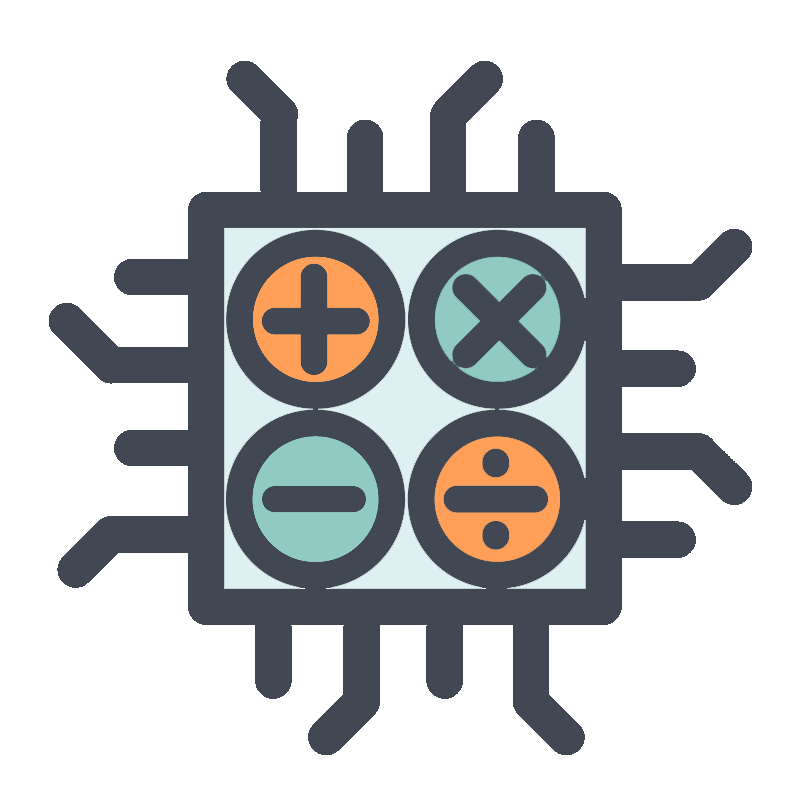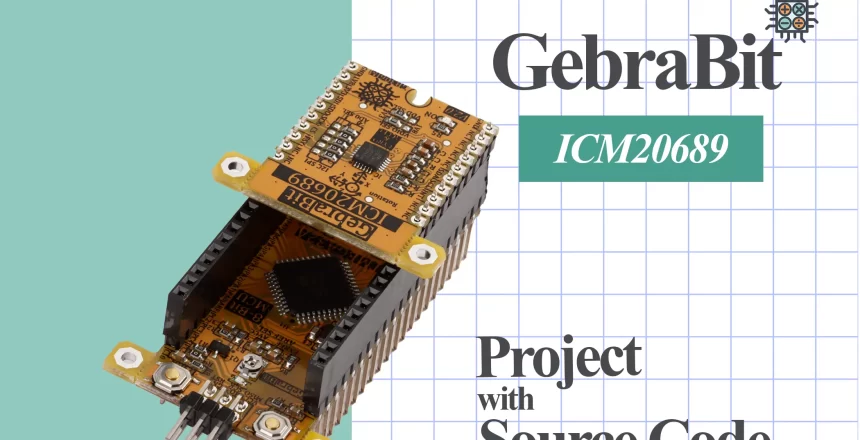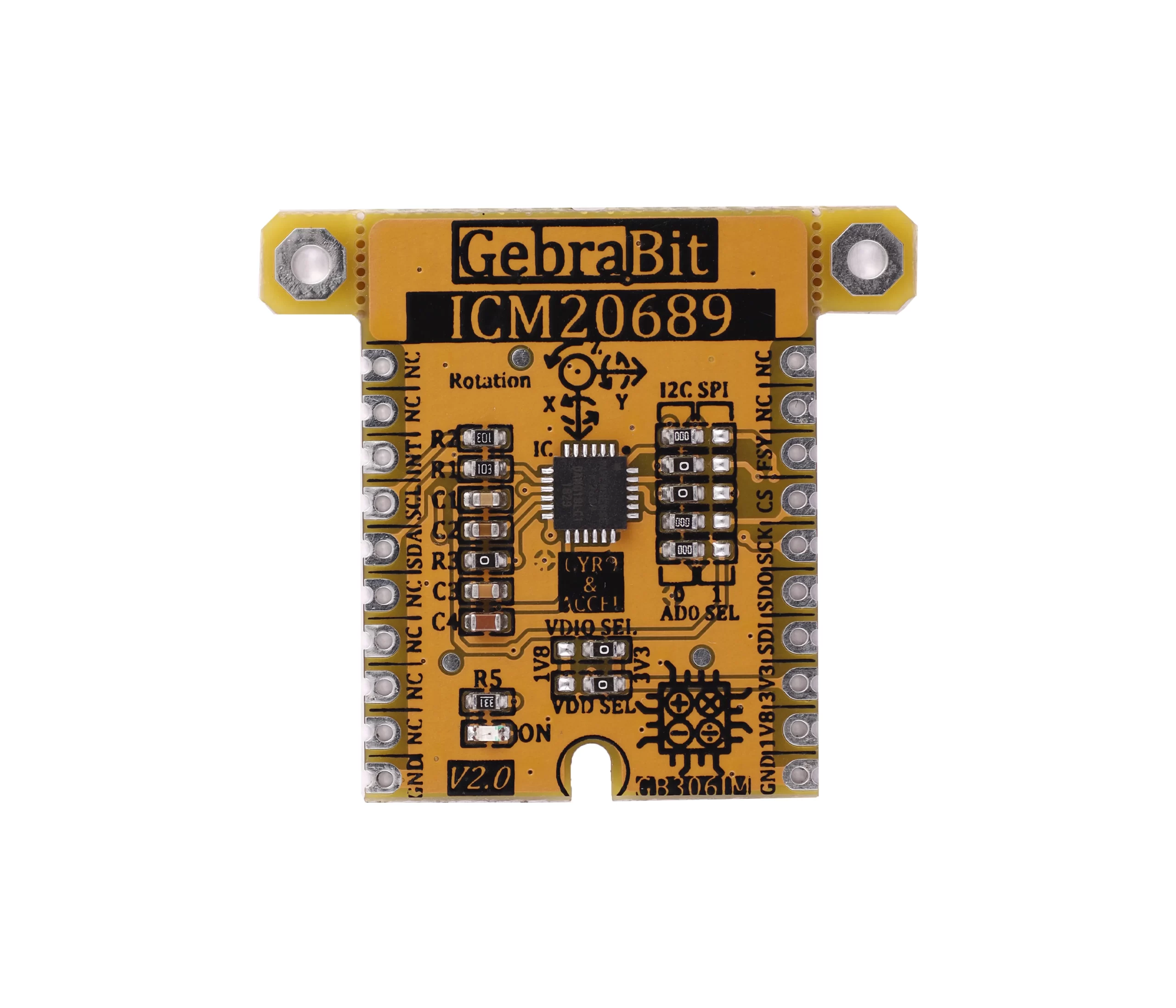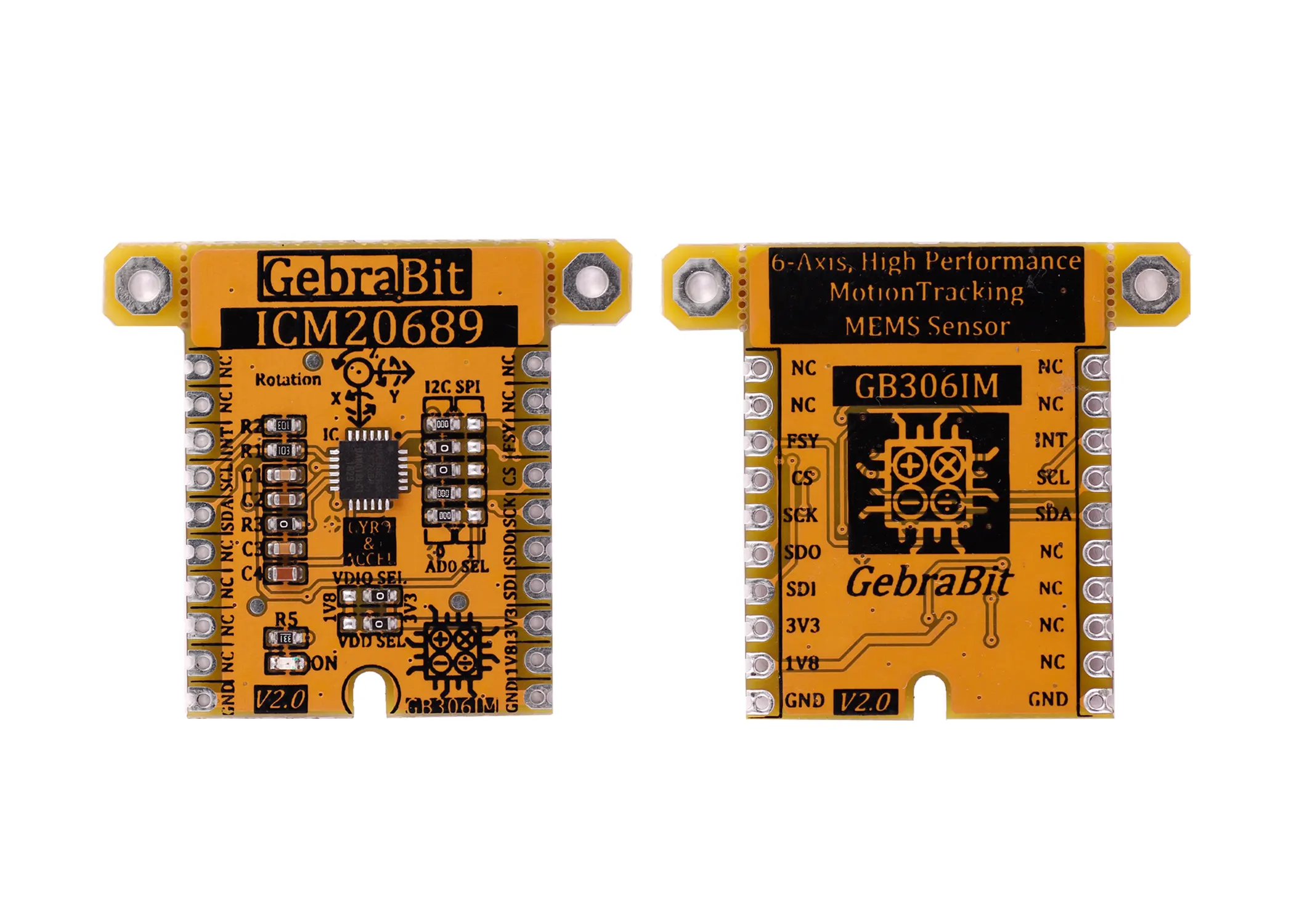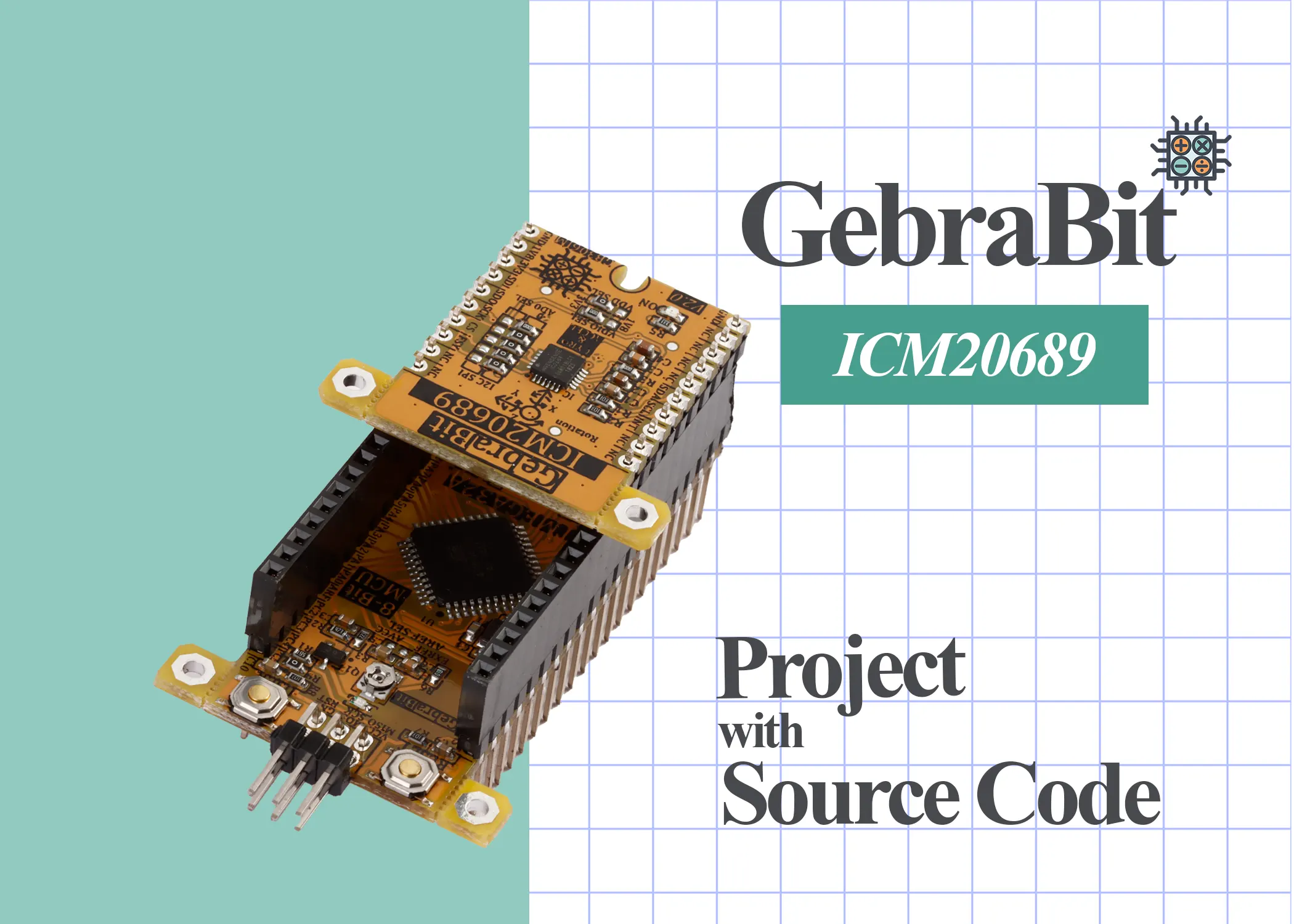What's the purpose of this project?
In this section, we are going to launch the ICM20689 sensor using ARM microcontroller, STM32F series. In order to use more conveniently and optimally in this project, we use two ready modules GB306IM and GebraBit STM32F303. These two modules contain the minimum necessary elements of the ICM20689 sensor and the STM32F microcontroller, which are provided by the GebraBit team to facilitate the work.
What are we going to learn in this tutorial?
In this tutorial, in addition to setting up and using the ICM20689 sensor, you will get to know all the ICM20689 sensor registers, how to set the various parts of the STM32 microcontroller to set up this sensor using the SPI protocol, how to use the GB306IM module specific library and driver file. You will also learn how to declare functions and finally receive sensor data in the Keil compiler.
What do we need to start this project?
As you probably know, we need some hardware and software to do this project. The titles of these hardware and software are provided to you in the table below and you can prepare/download by clicking on each of them and get ready to start.
|
Required hardware
|
Required software
|
|---|---|
|
Keil compiler
|
|
|
STM32CubeMX program
|
|
|
ST-LINK/V2 programmer
|
To do so, first we should select the SPI communication protocol using the on-board jumpers. Then we place the GebraBit ICM20689 module as Pin to Pin on the GebraBit STM32F303 module as shown in the below picture :

Note: Please note that the image above is only meant to show how the GebraBit ICM20689 module is laid out pin-to-pin to his GebraBit STM32F303 module. Therefore, the correct state of the onboard select jumper must be selected to use the SPI communication protocol.
Finally, in the ‘Watch 1’ window of the Keil compiler in ‘debug session’ mode, you can see the temperature, acceleration, and angular velocity values along the three ‘X, Y, Z’ axes in real time.
STM32CubeMX settings
In the following, we will review the settings related to each of the ‘SPI’, ‘RCC’, ‘Debug’ and ‘Clock’ sections of the STM32F303 microcontroller for developing the GebraBit ICM20689 module.
RCC settings
In the RCC section, we will select an external clock,due to the presence of “8Mhz” crystal in the GebraBit STM32F303 module

Debug & Programming settings
Regarding the access to “SWCLK” and “SWDIO” pins in the GebraBit STM32F303 module, to reduce the number of pins during “Debug & Programming”, in the “SYS” block, we select the “Serial Wire” option in the “Debug” section:

SPI settings
To communicate with the GebraBit STM32F303 module via SPI, we select the “Full Duplex Master” mode and select the PB3, PB4, and PB5 pins as SCK, MISO and MOSI and define the PC13 pin as CS:

According to the sensor data sheet, the settings of the SPI parameters in the “Parameter Settings” section will be set as shown in the above image.
Clock settings
The “clock” settings for each part of the STM32F303 microcontroller in this code, are as follows:

Project Manager settings
“Project Manager” settings are as follows, here we have used “MDK-ARM” version “5.32” compiler:

After completing all the above settings, we can develop our code easily just by one click on “GENERATE CODE” and adding the ICM20689 library and driver (provided by GebraBit).
You can download the “STM32Cube MX”, “ICM20689 library”, “driver” and KEIL project at the end of this tutorial.

ICM20689 library and driver
In addition to modular design of various sensors and ICs, GebraBit provides various structured hardware independent C language libraries to help users easily setup and develop software.
For this purpose, after preparing each GebraBit module, the users can refer to the “toturial” section of the desired module and download the dedicated library, which contains the “ .h” and “ .c” file (Header and Source) and a sample training program under “GebraBit STM32F303”, “GebraBit ATMEGA32A” or “Arduino” development boards.
All the defined functions and structures in the library are commented in full detail and all the received parameters in the arguments of the functions and their return values, are briefly explained. Since the libraries are hardware independed. , the user can easily add the library in any of their favorite compilers and develop it by desired microcontroller and development board.
GebraBit ICM20689.h header file
In this file, based on the datasheet of the sensor or IC, all address registers, the values of each register are defined in the form of “Enumeration”. Also, the casing of the ICM20689 sensor and the configurations related to each of the ICM20689 sensor internal blocks are defined in the form of a “STRUCT” with the name GebraBit_ ICM20689. Finally, in the Debug Session environment, all the configurations related to each block can be seen in real time.
ICM20689 _Interface Enum
This enum is used to select the communication protocol with the sensor:
typedef enum interface
{
NOT_SPI = 0,
IS_SPI
}ICM20689_Interface;
ICM20689_Accel_Fs_Sel Enum
This enum is used to select the Full Scale Range of the Accelerometer sensor:
typedef enum accel_fs_sel
{
FULL_SCALE_2g = 0,
FULL_SCALE_4g ,
FULL_SCALE_8g ,
FULL_SCALE_16g
}ICM20689_Accel_Fs_Sel;
ICM20689_Accel_Scale_Factor Enum
This enum is used to select the Scale Factor value of the Accelerometer sensor:
typedef enum Accel_Scale_Factor
{
SCALE_FACTOR_16384_LSB_g = 16384,
SCALE_FACTOR_8192_LSB_g = 8192,
SCALE_FACTOR_4096_LSB_g = 4096,
SCALE_FACTOR_2048_LSB_g = 2048,
}ICM20689_Accel_Scale_Factor;
ICM20689_Gyro_Fs_Sel Enum
This enum is used to select the Full Scale value of the Gyroscope sensor:
typedef enum gyro_fs_sel
{
FS_250_DPS ,
FS_500_DPS ,
FS_1000_DPS ,
FS_2000_DPS
}ICM20689_Gyro_Fs_Sel;
ICM20689_Gyro_Scale_Factor Enum
This enum is used to select the Scale Factor value of the Gyroscope sensor.
typedef enum Gyro_Scale_Factor
{
SCALE_FACTOR_131_LSB_DPS = 131
SCALE_FACTOR_65p5_LSB_DPS = 65,
SCALE_FACTOR_32p8_LSB_DPS = 32,
SCALE_FACTOR_16p4_LSB_DPS = 16
}ICM20689_Gyro_Scale_Factor;
ICM20689_FIFO_MODE Enum
The FIFO working mode of the sensor is set By using the values of this enum:
typedef enum FIFO_Config
{
STREAM_TO_FIFO ,
STOP_ON_FULL_FIFO_SNAPSHOT = 1
}ICM20689_FIFO_MODE ;
ICM20689_Ability Enum
The values of this enum are used to activate and deactivate different parts of the sensor:
typedef enum Ability
{
Disable = 0,
Enable
}ICM20689_Ability;
ICM20689_Power_Mode Enum
The values of this enum are used to set the Power Mode of the sensor:
typedef enum Power_Mode
{
ICM20689_LOW_NOISE = 0,
ICM20689_LOW_POWER = 1,
ICM20689 _SLEEP_OFF = 2
} ICM20689_Power_Mode;
ICM20689_ GYRO_Averaging_Filter Enum
The values of this enum are used to determine the filter used in the Gyroscope sensor in Low Power mode:
typedef enum
{
GYRO_AVERAGE_1_SAMPLES_FILTER = 0 ,
GYRO_AVERAGE_2_SAMPLES_FILTER = 1 ,
GYRO_AVERAGE_4_SAMPLES_FILTER = 2 ,
GYRO_AVERAGE_8_SAMPLES_FILTER = 3 ,
GYRO_AVERAGE_16_SAMPLES_FILTER = 4 ,
GYRO_AVERAGE_32_SAMPLES_FILTER = 5 ,
GYRO_AVERAGE_64_SAMPLES_FILTER = 6 ,
GYRO_AVERAGE_128_SAMPLES_FILTER= 7
} ICM20689_GYRO_Averaging_Filter;
ICM20689_ ACCEL_Averaging_Filter Enum
To determine the filter used in the Accelerometer sensor in Low Power mode, the values of this enum are used:
{
GYRO_AVERAGE_1_SAMPLES_FILTER = 0 ,
GYRO_AVERAGE_2_SAMPLES_FILTER = 1 ,
GYRO_AVERAGE_4_SAMPLES_FILTER = 2 ,
GYRO_AVERAGE_8_SAMPLES_FILTER = 3 ,
GYRO_AVERAGE_16_SAMPLES_FILTER = 4 , GYRO_AVERAGE_32_SAMPLES_FILTER = 5 ,
GYRO_AVERAGE_64_SAMPLES_FILTER = 6 ,
GYRO_AVERAGE_128_SAMPLES_FILTER= 7
} ICM20689_GYRO_Averaging_Filter;
ICM20689_Preparation Enum
typedef enum Preparation
{
IS_NOT_Ready = 0,
IS_Ready
}ICM20689_Preparation;
ICM20689_Reset_Status Enum
typedef enum Reset_Status
{
DONE = 0,
FAILED
}ICM20689_Reset_Status;
ICM20689_FIFO_Ability Enum
This Enum is used to enable or disable FIFO:
typedef enum FIFO_Ability
{
FIFO_DISABLE = 0,
FIFO_ENABLE
} ICM20689_FIFO_Ability;
ICM20689_Get_DATA Enum
How to receive data from the sensor is described in this enum:
typedef enum Get_DATA
{
FROM_REGISTER = 0,
FROM_FIFO
} ICM20689_Get_DATA;
ICM20689__ DMP_LP Enum
This Enum is used to enable or disable DMP in LOW POWER mode:
typedef enum DMP_LP
{
NOT_DMP_LOW_POWER = 0,
DMP_LOW_POWER
} ICM20689_DMP_LP;
ICM20689_Sleep Enum
The values of this enum are used to set the sensor working mode:
typedef enum Sleep
{
ICM20689_AWAKE = 0 ,
ICM20689_SLEEP
}ICM20689_Sleep ;
ICM20689_Clock_Source Enum
The values of this enum are used to determine the clock of the sensor :
typedef enum Clock_Source
{
INTERNAL_20MHZ_OSCILLATOR = 0,
AUTO_SELECT = 1,
CLOCK_STOP = 7
}ICM20689_Clock_Source ;
ICM20689_Sensor Enum
To enable or disable each of the sensors, the values of this enum are used:
typedef enum Sensor
{
SENSOR_ENABLE = 0,
SENSOR_DISABLE = 7
}ICM20689_Sensor ;
ICM20689_INT_Level Enum
To determine the basic logic level of Interrupt, the values of this enum are used:
typedef enum int_level
{
ACTIVE_HIGH = 0,
ACTIVE_LOW
} ICM20689_INT_Level;
ICM20689_Latch_Type Enum
The values of this enum are used to determine the latch type of the Interrupt output:
typedef enum latch_type
{
_50_US = 0,
HELD_STATUS_CLEAR
} ICM20689_Latch_Type;
ICM20689_INT_Type Enum
The values of this enum are used to determine the Interrupt output type:
typedef enum int_type
{
PUSH_PULL = 0,
OPEN_DRAIN
}ICM20689_INT_Type;
ICM20689_FIFO_ Reset
The FIFO of the sensor can be reset by using the values of this Enum:
typedef enum FIFO_Reset
{
FIFO_DE_ASSERT = 0,
FIFO_ASSERT = 31
} ICM20689_FIFO_Reset;
ICM20689_FIFO_Overflow Enum
The values of this enum indicate FIFO overflows or not:
typedef enum FIFO_Overflow
{
FIFO_IS_NOT_OVERFLOW = 0,
FIFO_IS_OVERFLOW = 1
} ICM20689_FIFO_Overflow;
ICM20689_ Sample_Rate Enum
The values of this enum determine the value of the output data rate:
typedef enum sample_rate
{
_1_KHz = 1000,
_4_KHz = 4000,
_8_KHz = 8000,
_32_KHz = 32000
}ICM20689_Sample_Rate ;
ICM20689_ FCHOICEB Enum
To enable or disable the DLPF filter, the values of this enum are used:
typedef enum FCHOICEB
{
ENABLE_DLPF_FCHOICEB = 1,
BYPASS_DLPF_FCHOICEB = 0,
}ICM20689_FCHOICEB;
ICM20689_ Gyro_DLPF_CFG Enum
The values of this enum are used to determine the DLPF filter in the gyroscope sensor:
typedef enum Gyro_DLPF_CFG
{
ICM20689_GYRO_TEMP_DLPF_250 = 0,
ICM20689_GYRO_TEMP_DLPF_176 = 1,
ICM20689_GYRO_TEMP_DLPF_92 = 2,
ICM20689_GYRO_TEMP_DLPF_41 = 3,
ICM20689_GYRO_TEMP_DLPF_20 = 4,
ICM20689_GYRO_TEMP_DLPF_10 = 5,
ICM20689_GYRO_TEMP_DLPF_5 = 6,
ICM20689_GYRO_TEMP_DLPF_3281= 7
}ICM20689_GYRO_DLPF ;
ICM20689_ Accel_DLPF_CFG Enum
To determine the DLPF filter in the accelerometer sensor, the values of this enum are used:
typedef enum Accel_DLPF_CFG
{
ICM20689_ACCEL_DLPF_218 = 1,
ICM20689_ACCEL_DLPF_99 = 2,
ICM20689_ACCEL_DLPF_45 = 3,
ICM20689_ACCEL_DLPF_21 = 4,
ICM20689_ACCEL_DLPF_10 = 5,
ICM20689_ACCEL_DLPF_5 = 6,
ICM20689_ACCEL_DLPF_420 = 7
}ICM20689_ACCEL_DLPF ;
GebraBit_ICM20689 structure
Declaration of functions
At the end of this file, all the functions for reading and writing in ICM20689 registers, sensor configuration , FIFO and receiving data from the sensor are declared:
/********************************************************
*Declare Read&Write ICM20689 Register Values Functions *
********************************************************/
extern uint8_t GB_ICM20689_Read_Reg_Data ( uint8_t regAddr,uint8_t* data);
extern uint8_t GB_ICM20689_Read_Reg_Bits (uint8_t regAddr,uint8_t start_bit, uint8_t len, uint8_t* data);
extern uint8_t GB_ICM20689_Burst_Read(uint8_t regAddr,uint8_t *data, uint16_t byteQuantity);
extern uint8_t GB_ICM20689_Write_Reg_Data(uint8_t regAddr, uint8_t data);
extern uint8_t GB_ICM20689_Write_Reg_Bits(uint8_t regAddr, uint8_t start_bit, uint8_t len, uint8_t data);
extern uint8_t GB_ICM20689_Burst_Write ( uint8_t regAddr,uint8_t *data, uint16_t byteQuantity);
/********************************************************
* Declare ICM20689 Configuration Functions *
********************************************************/
extern void GB_ICM20689_Soft_Reset ( GebraBit_ICM20689 * ICM20689 );
extern void GB_ICM20689_Who_am_I(GebraBit_ICM20689 * ICM20689);
extern void GB_ICM20689_Select_SPI4_Interface(GebraBit_ICM20689 * ICM20689 , ICM20689_Interface spisel);
extern void GB_ICM20689_DMP(GebraBit_ICM20689* ICM20689 ,ICM20689_Ability dmp,ICM20689_DMP_LP dmp_lp);
extern void GB_ICM20689_DMP_Reset(GebraBit_ICM20689* ICM20689 ,ICM20689_Ability rst);
extern void GB_ICM20689_DMP_Interrupt(ICM20689_Ability interrupt);
extern void GB_ICM20689_Sleep_Awake (GebraBit_ICM20689 * ICM20689, ICM20689_Sleep working ) ;
extern void GB_ICM20689_ACCEL_Power_Mode(GebraBit_ICM20689* ICM20689 ,ICM20689_Power_Mode pmode);
extern void GB_ICM20689_GYRO_Power_Mode(GebraBit_ICM20689* ICM20689 ,ICM20689_Power_Mode pmode);
extern void GB_ICM20689_Set_Clock_Source(GebraBit_ICM20689 * ICM20689 , ICM20689_CLK clk) ;
extern void GB_ICM20689_Temperature(GebraBit_ICM20689* ICM20689 ,ICM20689_Ability temp);
extern void GB_ICM20689_Accelerometer(GebraBit_ICM20689 * ICM20689 , ICM20689_Sensor accel);
extern void GB_ICM20689_Gyroscope(GebraBit_ICM20689 * ICM20689 , ICM20689_Sensor gyro) ;
extern void GB_ICM20689_Set_INT_Pin(GebraBit_ICM20689 * ICM20689 , ICM20689_INT_Level level ,ICM20689_INT_Type type , ICM20689_Latch_Type latch );
extern ICM20689_Preparation GB_ICM20689_Check_Data_Preparation(GebraBit_ICM20689 * ICM20689);
extern void GB_ICM20689_GYRO_Full_Scale ( GebraBit_ICM20689 * ICM20689 , ICM20689_Gyro_Fs_Sel fs ) ;
extern void GB_ICM20689_GYRO_Low_Pass_Filter (GebraBit_ICM20689 * ICM20689 , ICM20689_FCHOICEB bypass ) ;
extern void GB_ICM20689_GYRO_TEMP_Low_Pass_Filter_Value (GebraBit_ICM20689 * ICM20689 , ICM20689_GYRO_TEMP_DLPF dlpf );
extern void GB_ICM20689_GYRO_LP_Averaging_Filter (GebraBit_ICM20689 * ICM20689 , ICM20689_GYRO_Averaging_Filter avg );
extern void GB_ICM20689_GYRO_Output_Sample_Rate (GebraBit_ICM20689 * ICM20689 , uint16_t rate_hz);
extern void GB_ICM20689_ACCEL_Full_Scale ( GebraBit_ICM20689 * ICM20689 , ICM20689_Accel_Fs_Sel fs );
extern void GB_ICM20689_ACCEL_Low_Pass_Filter (GebraBit_ICM20689 * ICM20689 , ICM20689_FCHOICEB bypass );
extern void GB_ICM20689_ACCEL_Low_Pass_Filter_Value (GebraBit_ICM20689 * ICM20689 , ICM20689_ACCEL_DLPF dlpf );
extern void GB_ICM20689_ACCEL_LP_Averaging_Filter (GebraBit_ICM20689 * ICM20689 , ICM20689_ACCEL_Averaging_Filter avg );
extern void GB_ICM20689_Output_Sample_Rate (GebraBit_ICM20689 * ICM20689 , uint16_t rate_hz);
extern void GB_ICM20689_FIFO_Overflow_Interrupt(GebraBit_ICM20689 * ICM20689 , ICM20689_Ability data_ovf_int);
extern void GB_ICM20689_Data_Ready_Interrupt(GebraBit_ICM20689 * ICM20689 , ICM20689_Ability data_ready_int);
/********************************************************
* Declare ICM20689 FIFO Functions *
********************************************************/
extern void GB_ICM20689_Access_Serial_Interface_To_FIFO(GebraBit_ICM20689 * ICM20689 , ICM20689_Ability interface_access_fifo);
extern ICM20689_FIFO_Overflow GB_ICM20689_Check_FIFO_Overflow(GebraBit_ICM20689 * ICM20689) ;
extern void GB_ICM20689_Write_ACCEL_FIFO(GebraBit_ICM20689 * ICM20689 , ICM20689_Ability accel_fifo ) ;
extern void GB_ICM20689_Write_GYRO_FIFO(GebraBit_ICM20689 * ICM20689 , ICM20689_Ability gyro_fifo ) ;
extern void GB_ICM20689_Write_TEMP_FIFO(GebraBit_ICM20689 * ICM20689 , ICM20689_Ability temp_fifo );
extern void GB_ICM20689_FIFO_Mode(GebraBit_ICM20689 * ICM20689 , ICM20689_FIFO_Mode fifo_mode );
extern void GB_ICM20689_FIFO_Reset(void) ;
extern void GB_ICM20689_GET_FIFO_Count (GebraBit_ICM20689 * ICM20689 ) ;
extern void GB_ICM20689_Read_FIFO(GebraBit_ICM20689 * ICM20689 , uint16_t qty);
extern void GB_ICM20689_Get_ACCEL_GYRO_TEMP_From_FIFO(GebraBit_ICM20689 * ICM20689);
/********************************************************
* Declare ICM20689 DATA Functions *
********************************************************/
extern void GB_ICM20689_Get_Temp_Register_Raw_Data(GebraBit_ICM20689 * ICM20689);
extern void GB_ICM20689_Get_Temp_Valid_Data(GebraBit_ICM20689 * ICM20689);
extern void GB_ICM20689_Get_GYRO_X_Register_Raw_DATA(GebraBit_ICM20689 * ICM20689);
extern void GB_ICM20689_Get_GYRO_Y_Register_Raw_DATA(GebraBit_ICM20689 * ICM20689);
extern void GB_ICM20689_Get_GYRO_Z_Register_Raw_DATA(GebraBit_ICM20689 * ICM20689);
extern void GB_ICM20689_Get_GYRO_DATA_X_Valid_Data(GebraBit_ICM20689 * ICM20689);
extern void GB_ICM20689_Get_GYRO_DATA_Y_Valid_Data(GebraBit_ICM20689 * ICM20689);
extern void GB_ICM20689_Get_GYRO_DATA_Z_Valid_Data(GebraBit_ICM20689 * ICM20689);
extern void GB_ICM20689_Get_ACCEL_X_Register_Raw_DATA(GebraBit_ICM20689 * ICM20689);
extern void GB_ICM20689_Get_ACCEL_Y_Register_Raw_DATA(GebraBit_ICM20689 * ICM20689);
extern void GB_ICM20689_Get_ACCEL_Z_Register_Raw_DATA(GebraBit_ICM20689 * ICM20689);
extern void GB_ICM20689_Get_ACCEL_DATA_X_Valid_Data(GebraBit_ICM20689 * ICM20689);
extern void GB_ICM20689_Get_ACCEL_DATA_Y_Valid_Data(GebraBit_ICM20689 * ICM20689);
extern void GB_ICM20689_Get_ACCEL_DATA_Z_Valid_Data(GebraBit_ICM20689 * ICM20689);
extern void GB_ICM20689_Get_Temperature(GebraBit_ICM20689 * ICM20689);
extern void GB_ICM20689_Get_XYZ_GYROSCOPE(GebraBit_ICM20689 * ICM20689);
extern void GB_ICM20689_Get_XYZ_ACCELERATION(GebraBit_ICM20689 * ICM20689);
extern void GB_ICM20689_Get_ACCEL_GYRO_TEMP_From_Registers(GebraBit_ICM20689 * ICM20689);
extern void GB_ICM20689_FIFO_Data_Partition_ACCEL_GYRO_XYZ_TEMP(GebraBit_ICM20689 * ICM20689);
extern void GB_ICM20689_Get_Data(GebraBit_ICM20689 * ICM20689 , ICM20689_Get_DATA get_data);
/********************************************************
* Declare ICM20689 HIGH LEVEL Functions *
********************************************************/
extern void GB_ICM20689_FIFO_Configuration ( GebraBit_ICM20689 * ICM20689 , ICM20689_FIFO_Ability fifo );
extern void GB_ICM20689_Set_Power_Management(GebraBit_ICM20689 * ICM20689 , ICM20689_Power_Mode pmode) ;
extern void GB_ICM20689_initialize( GebraBit_ICM20689 * ICM20689 );
extern void GB_ICM20689_Configuration(GebraBit_ICM20689 * ICM20689, ICM20689_FIFO_Ability fifo);
GebraBit_ICM20689.c source file
In this file, which is written in C language, all the functions are commented in full detail, and all the parameters received in the arguments of the functions and their return values are clearly explained so we confine to these explanations and invite users to check this file directly for more information.

Sample program in Keil
After making the Keil project by STM32CubeMX and adding the “GebraBit_ICM20689.c” library provided by GebraBit, we will examine the “main .c” file of the sample tutorial and view the output of the GebraBit_ ICM20689 module in the “watch” part in the the Keil compiler “Debugging” environment.
Description of “main.c” file
If you look carefully at the beginning part of the “main.c” file, you will notice that the “GebraBit_ ICM20689.h” header has been added to access the structures and functions required by the GebraBit ICM20689 module. In the next part, a variable named ICM20689_Module of the GebraBit_ ICM20689 structure type (this structure is in the GebraBit_ICM20689 header and is explained in the GebraBit_ ICM20689 library description section) is defined for the configuration of the GebraBit ICM20689 module:
/* Private typedef -----------------------------------------------------------*/
/* USER CODE BEGIN PTD */
GebraBit_ICM20689 ICM20689_Module;
/* USER CODE END PTD */
In the next part of the written code, the configuration and settings of the GebraBit ICM20689 module are done by using the GB_ICM20689_initialize() and GB_ ICM20689_Configuration() functions:
GB_ICM20689_initialize( &ICM20689_Module );
GB_ICM20689_Configuration(&ICM20689_Module ,FIFO_ENABLE);
//GB_ICM20689_Configuration(&ICM20689_Module , FIFO_DISABLE );
And finally, in the “while” part of the program, the values of the GebraBit ICM20689 module in 3 axes X, Y, Z and temperature are continuously received:
GB_ICM20689_Get_Data( &ICM20689_Module , FROM_FIFO );
//GB_ICM20689_Get_Data( &ICM20689_Module , FROM_REGISTER );
By removing the GB_ ICM20689_Configuration(&ICM20689_Module , FIFO_DISABLE ); and GB_ ICM20689_Get_Data( & ICM20689_Module , FROM_REGISTER ) functions; Data values can be read directly from the data registers.
The “main.c” file code text:
/* USER CODE BEGIN Header */
/*
* ________________________________________________________________________________________________________
* Copyright (c) 2020 GebraBit Inc. All rights reserved.
*
* This software, related documentation and any modifications thereto (collectively “Software”) is subject
* to GebraBit and its licensors' intellectual property rights under U.S. and international copyright
* and other intellectual property rights laws.
*
* GebraBit and its licensors retain all intellectual property and proprietary rights in and to the Software
* and any use, reproduction, disclosure or distribution of the Software without an express license agreement
* from GebraBit is strictly prohibited.
* THE SOFTWARE IS PROVIDED "AS IS", WITHOUT WARRANTY OF ANY KIND, EXPRESS OR IMPLIED, INCLUDING BUT
* NOT LIMITED TO THE WARRANTIES OF MERCHANTABILITY, FITNESS FOR A PARTICULAR PURPOSE AND NON-INFRINGEMENT IN
* NO EVENT SHALL GebraBit BE LIABLE FOR ANY DIRECT, SPECIAL, INDIRECT, INCIDENTAL, OR CONSEQUENTIAL DAMAGES,
* OR ANY DAMAGES WHATSOEVER RESULTING FROM LOSS OF USE, DATA OR PROFITS, WHETHER IN AN ACTION OF CONTRACT,
* NEGLIGENCE OR OTHER TORTIOUS ACTION, ARISING OUT OF OR IN CONNECTION WITH THE USE OR PERFORMANCE
* OF THE SOFTWARE.
* ________________________________________________________________________________________________________
*/
/**
******************************************************************************
* @file : main.c
* @brief : Main program body
* @Author : Mehrdad Zeinali
******************************************************************************
* @attention
*
* Copyright (c) 2022 STMicroelectronics.
* All rights reserved.
*
* This software is licensed under terms that can be found in the LICENSE file
* in the root directory of this software component.
* If no LICENSE file comes with this software, it is provided AS-IS.
*
******************************************************************************
*/
/* USER CODE END Header */
/* Includes ------------------------------------------------------------------*/
#include "main.h"
//#include "i2c.h"
#include "spi.h"
#include "gpio.h"
#include "GebraBit_ICM20689.h"
/* Private includes ----------------------------------------------------------*/
/* USER CODE BEGIN Includes */
/* USER CODE END Includes */
/* Private typedef -----------------------------------------------------------*/
/* USER CODE BEGIN PTD */
GebraBit_ICM20689 ICM20689_Module;
/* USER CODE END PTD */
/* Private define ------------------------------------------------------------*/
/* USER CODE BEGIN PD */
/* USER CODE END PD */
/* Private macro -------------------------------------------------------------*/
/* USER CODE BEGIN PM */
/* USER CODE END PM */
/* Private variables ---------------------------------------------------------*/
/* USER CODE BEGIN PV */
/* USER CODE END PV */
/* Private function prototypes -----------------------------------------------*/
void SystemClock_Config(void);
/* USER CODE BEGIN PFP */
/* USER CODE END PFP */
/* Private user code ---------------------------------------------------------*/
/* USER CODE BEGIN 0 */
/* USER CODE END 0 */
/**
* @brief The application entry point.
* @retval int
*/
int main(void)
{
/* USER CODE BEGIN 1 */
/* USER CODE END 1 */
/* MCU Configuration--------------------------------------------------------*/
/* Reset of all peripherals, Initializes the Flash interface and the Systick. */
HAL_Init();
/* USER CODE BEGIN Init */
/* USER CODE END Init */
/* Configure the system clock */
SystemClock_Config();
/* USER CODE BEGIN SysInit */
/* USER CODE END SysInit */
/* Initialize all configured peripherals */
MX_GPIO_Init();
//MX_I2C1_Init();
MX_SPI1_Init();
GB_ICM20689_initialize( &ICM20689_Module );
GB_ICM20689_Configuration(&ICM20689_Module ,FIFO_ENABLE );
//GB_ICM20689_Configuration(&ICM20689_Module , FIFO_DISABLE );
/* USER CODE END 2 */
/* Infinite loop */
/* USER CODE BEGIN WHILE */
while (1)
{
/* USER CODE END WHILE */
/* USER CODE BEGIN 3 */
//GB_ICM20689_Get_Data( &ICM20948_Module , FROM_REGISTER );
GB_ICM20689_Get_Data( &ICM20689_Module , FROM_FIFO );
}
/* USER CODE END 3 */
}
/**
* @brief System Clock Configuration
* @retval None
*/
void SystemClock_Config(void)
{
RCC_OscInitTypeDef RCC_OscInitStruct = {0};
RCC_ClkInitTypeDef RCC_ClkInitStruct = {0};
RCC_PeriphCLKInitTypeDef PeriphClkInit = {0};
/** Initializes the RCC Oscillators according to the specified parameters
* in the RCC_OscInitTypeDef structure.
*/
RCC_OscInitStruct.OscillatorType = RCC_OSCILLATORTYPE_HSE;
RCC_OscInitStruct.HSEState = RCC_HSE_ON;
RCC_OscInitStruct.HSEPredivValue = RCC_HSE_PREDIV_DIV1;
RCC_OscInitStruct.HSIState = RCC_HSI_ON;
RCC_OscInitStruct.PLL.PLLState = RCC_PLL_ON;
RCC_OscInitStruct.PLL.PLLSource = RCC_PLLSOURCE_HSE;
RCC_OscInitStruct.PLL.PLLMUL = RCC_PLL_MUL9;
if (HAL_RCC_OscConfig(&RCC_OscInitStruct) != HAL_OK)
{
Error_Handler();
}
/** Initializes the CPU, AHB and APB buses clocks
*/
RCC_ClkInitStruct.ClockType = RCC_CLOCKTYPE_HCLK|RCC_CLOCKTYPE_SYSCLK
|RCC_CLOCKTYPE_PCLK1|RCC_CLOCKTYPE_PCLK2;
RCC_ClkInitStruct.SYSCLKSource = RCC_SYSCLKSOURCE_PLLCLK;
RCC_ClkInitStruct.AHBCLKDivider = RCC_SYSCLK_DIV1;
RCC_ClkInitStruct.APB1CLKDivider = RCC_HCLK_DIV2;
RCC_ClkInitStruct.APB2CLKDivider = RCC_HCLK_DIV1;
if (HAL_RCC_ClockConfig(&RCC_ClkInitStruct, FLASH_LATENCY_2) != HAL_OK)
{
Error_Handler();
}
PeriphClkInit.PeriphClockSelection = RCC_PERIPHCLK_I2C1;
PeriphClkInit.I2c1ClockSelection = RCC_I2C1CLKSOURCE_SYSCLK;
if (HAL_RCCEx_PeriphCLKConfig(&PeriphClkInit) != HAL_OK)
{
Error_Handler();
}
}
/* USER CODE BEGIN 4 */
/* USER CODE END 4 */
/**
* @brief This function is executed in case of error occurrence.
* @retval None
*/
void Error_Handler(void)
{
/* USER CODE BEGIN Error_Handler_Debug */
/* User can add his own implementation to report the HAL error return state */
__disable_irq();
while (1)
{
}
/* USER CODE END Error_Handler_Debug */
}
#ifdef USE_FULL_ASSERT
/**
* @brief Reports the name of the source file and the source line number
* where the assert_param error has occurred.
* @param file: pointer to the source file name
* @param line: assert_param error line source number
* @retval None
*/
void assert_failed(uint8_t *file, uint32_t line)
{
/* USER CODE BEGIN 6 */
/* User can add his own implementation to report the file name and line number,
ex: printf("Wrong parameters value: file %s on line %d\r\n", file, line) */
/* USER CODE END 6 */
}
#endif /* USE_FULL_ASSERT */
Program output
After generating the Keil project using STM32CubeMX and adding the library, we connect the STLINK V2 programmer to the GebraBit STM32F303 using the STLINKV2 adapter:


STLINKV2 adapter:


By connecting the STLINK V2 programmer to the GebraBit STM32F303, there is no need to apply power to the GebraBit STM32F303 and GebraBit ICM20689 modules, because they receive their supply voltage directly from the STLINK V2 programmer.
finally, enter the “Debug” mode and by adding the “ICM20689_Module” to the “watch” window and running the program, we can see the changes of temperature and the GebraBit ICM20689 module values in the 3 axes( X, Y, Z) directly from the data registers and FIFO :
Receiving sensor data directly from data registers:

Receiving sensor data from FIFO:

In the following, you can download the “GebraBit ICM20689 module setup project” using the GebraBit STM32F303 module in the Keil environment, the “STM32CubeMX file”, the schematic of the modules and the “ICM20689 datasheet”.
